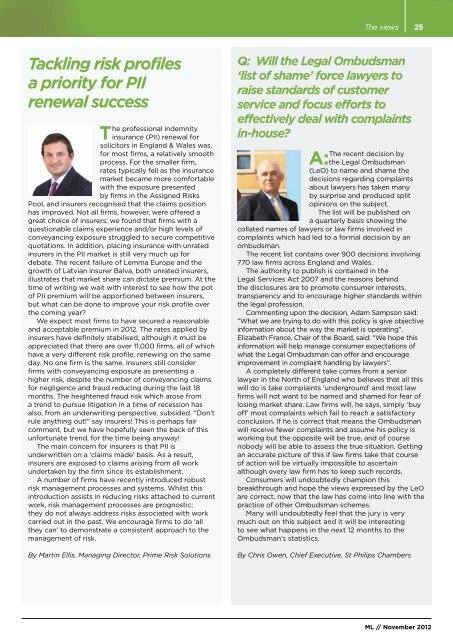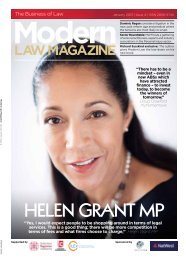Michael Napier
Michael Napier - Modern Law Magazine
Michael Napier - Modern Law Magazine
You also want an ePaper? Increase the reach of your titles
YUMPU automatically turns print PDFs into web optimized ePapers that Google loves.
The views25Tackling risk profilesa priority for PIIrenewal successThe professional indemnityinsurance (PII) renewal forsolicitors in England & Wales was,for most firms, a relatively smoothprocess. For the smaller firm,rates typically fell as the insurancemarket became more comfortablewith the exposure presentedby firms in the Assigned RisksPool, and insurers recognised that the claims positionhas improved. Not all firms, however, were offered agreat choice of insurers; we found that firms with aquestionable claims experience and/or high levels ofconveyancing exposure struggled to secure competitivequotations. In addition, placing insurance with unratedinsurers in the PII market is still very much up fordebate. The recent failure of Lemma Europe and thegrowth of Latvian insurer Balva, both unrated insurers,illustrates that market share can dictate premium. At thetime of writing we wait with interest to see how the potof PII premium will be apportioned between insurers,but what can be done to improve your risk profile overthe coming year?We expect most firms to have secured a reasonableand acceptable premium in 2012. The rates applied byinsurers have definitely stabilised, although it must beappreciated that there are over 11,000 firms, all of whichhave a very different risk profile, renewing on the sameday. No one firm is the same. Insurers still considerfirms with conveyancing exposure as presenting ahigher risk, despite the number of conveyancing claimsfor negligence and fraud reducing during the last 18months. The heightened fraud risk which arose froma trend to pursue litigation in a time of recession hasalso, from an underwriting perspective, subsided. “Don’trule anything out!” say insurers! This is perhaps faircomment, but we have hopefully seen the back of thisunfortunate trend, for the time being anyway!The main concern for insurers is that PII isunderwritten on a ‘claims made’ basis. As a result,insurers are exposed to claims arising from all workundertaken by the firm since its establishment.A number of firms have recently introduced robustrisk management processes and systems. Whilst thisintroduction assists in reducing risks attached to currentwork, risk management processes are prognostic;they do not always address risks associated with workcarried out in the past. We encourage firms to do ‘allthey can’ to demonstrate a consistent approach to themanagement of risk.By Martin Ellis, Managing Director, Prime Risk SolutionsQ: Will the Legal Ombudsman‘list of shame’ force lawyers toraise standards of customerservice and focus efforts toeffectively deal with complaintsin-house?The recent decision byA: the Legal Ombudsman(LeO) to name and shame thedecisions regarding complaintsabout lawyers has taken manyby surprise and produced splitopinions on the subject.The list will be published ona quarterly basis showing thecollated names of lawyers or law firms involved incomplaints which had led to a formal decision by anombudsman.The recent list contains over 900 decisions involving770 law firms across England and Wales.The authority to publish is contained in theLegal Services Act 2007 and the reasons behindthe disclosures are to promote consumer interests,transparency and to encourage higher standards withinthe legal profession.Commenting upon the decision, Adam Sampson said:“What we are trying to do with this policy is give objectiveinformation about the way the market is operating”.Elizabeth France, Chair of the Board, said: “We hope thisinformation will help manage consumer expectations ofwhat the Legal Ombudsman can offer and encourageimprovement in complaint handling by lawyers”.A completely different take comes from a seniorlawyer in the North of England who believes that all thiswill do is take complaints ‘underground’ and most lawfirms will not want to be named and shamed for fear oflosing market share. Law firms will, he says, simply ‘buyoff’ most complaints which fail to reach a satisfactoryconclusion. If he is correct that means the Ombudsmanwill receive fewer complaints and assume his policy isworking but the opposite will be true, and of coursenobody will be able to assess the true situation. Gettingan accurate picture of this if law firms take that courseof action will be virtually impossible to ascertainalthough every law firm has to keep such records.Consumers will undoubtedly champion thisbreakthrough and hope the views expressed by the LeOare correct, now that the law has come into line with thepractice of other Ombudsman schemes.Many will undoubtedly feel that the jury is verymuch out on this subject and it will be interestingto see what happens in the next 12 months to theOmbudsman’s statistics.By Chris Owen, Chief Executive, St Philips ChambersML // November 2012




